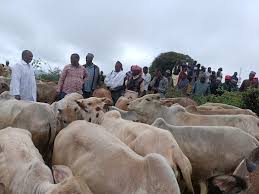

Galma Halake sits on a rock beside one of his goats, gently inspecting its front leg. The animal, slightly limping, nudges his hand as if in thanks. A year and a half ago, Halake had no livestock to tend. A deadly combination of drought and inter-communal conflict had swept through his community in Moyale, Marsabit county, stripping families of both their animals and way of life.
The drought of 2022 and 2023 ravaged the region. Only a few families managed to have a small number of their livestock survive the drought. “We had 200 goats and lost 180,” Halake recalls.
Most of the young men, who were rendered idle after their
families lost their livestock to drought, raided other manyattas to steal their
animals.
In the aftermath, frustrations gave way to violence. In the villages of Funan Ida, Rawana, Funan Qumbi, Tigo, Burgado and other parts of Moyale, clashes erupted between the Gabra and Borana communities.
“Manyattas were burnt down and water storage tanks were stolen. As you can see around, most homesteads don’t have water tanks, they are yet to recover from the loss,” Halake said.
His family also lost the only cow they used to milk.
“The calf survived, but there was no more milk for our tea or our children. We had to share the porridge we prepared with the calf so it can survive.”
Young men who dropped out from pastoralism moved into towns. This left them vulnerable and easily gullible to indulge in fuelling conflicts, engage in drug abuse, theft and other vices.
For Halake, they fully depended on their livestock. No one in his family was employed.
“When we needed to pay school fees or buy food, we’d sell a
goat,” he said.
To address this growing crisis, Welthungerhilfe through its SRAPLEA 2 project, partnered with Pastoralist Community Initiative and Development Assistance (Pacida) to support pastoralists dropouts, youth and families who had lost everything.
The goal was to restore livelihoods and offer alternatives to those who were weaving on the edge of desperation and promote peace between the warring communities.
Halake was among the beneficiaries. After learning about the project from a community-based coach, he enrolled to participate in the four-day training in Turbi town.
Mamo Malate, project manager with Pacida, said the sessions covered everything from business development and planning, financial management, entrepreneurship concepts and marketing strategies.
“They were also trained on animal husbandry (including) herd management, pests and disease control, as well as livestock balanced feeding routine,” Malate said.
Halake formed a group with 20 other participants. Each received Sh30,000 to start a business. Along with four others, they chose to invest in goat rearing. He bought four expectant goats, each at around Sh8,000 which was not an easy feat given the high prices and demand post drought.
Today, his herd has grown to 13. Milk is again part of his family’s meal. He’s even sold one goat at Sh7,500 to cover household expenses.
“The excess milk I get, I sell. That small income helps me buy
food and other things we need,” he said.
Halake’s success is more than personal. His group has also come together to build 12 latrines in their village, boosting hygiene and environmental health.
“Sometimes, when a
neighbour doesn’t have milk, we lend them one of our goats until it stops
lactating. This is how we build back our community,” he added.
Down in Turbi town, another beneficiary, Galgalo Huka, took a different path. He now runs butchery and an eatery.
“I had a small joint of selling soup and mutura. After the grant I bought a few goats and opened a butchery,” he said.
Huka’s butchery now supports his family. From his training, he opened a bank account and began saving.
For Malate, the knock-on effect of the project goes beyond livestock and businesses.
“The participants have reported significant economic empowerment at their households and contribution to community affairs like weddings, burials and environmental cleaning,” he said.
The programme supported eight groups of 20 participants each. While in small scale, its impact has been transformative especially in a region still healing from the trauma of climate shocks and conflict.
Halake is hopeful for the future. “I want to grow my herd, sell when they mature and buy more. I urge other young people to form groups and be ready when such opportunities come,” he said.
Instant analysis
The story of Galma Halake and others in Moyale reflects the transformative power of targeted community interventions in restoring dignity and livelihoods in conflict and climate-stricken regions. Through the SRAPLEA 2 project, young pastoralist dropouts have transitioned from despair to self-reliance, reviving not just their incomes but also communal bonds. Halake’s modest goat herd has become a lifeline for his family, while others like Galgalo Huka have ventured into business. This grassroots economic empowerment, coupled with peacebuilding and skill development, offers a sustainable model for resilience in pastoralist communities. It's proof that recovery is possible with the right support at the right time.












